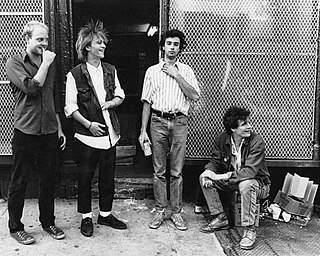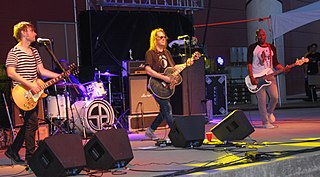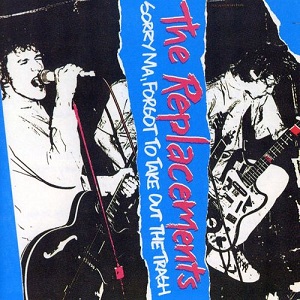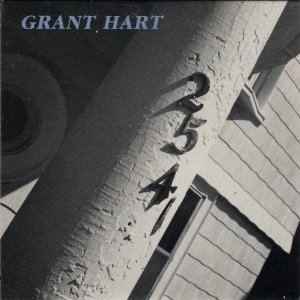
The Replacements were an American rock band formed in Minneapolis, Minnesota, in 1979. Initially a punk band, they are one of the main pioneers of alternative rock. The band was composed of the guitarist and vocalist Paul Westerberg, guitarist Bob Stinson, bass guitarist Tommy Stinson and drummer Chris Mars for most of its existence. Following several acclaimed albums, including Let It Be and Tim, Bob Stinson was kicked out of the band in 1986, and Slim Dunlap joined as lead guitarist. Steve Foley replaced Mars in 1990. Towards the end of the band's career, Westerberg exerted more control over the creative output. The group disbanded in 1991, with the members eventually pursuing various projects. A reunion was announced on October 3, 2012.

Soul Asylum is an American rock band formed in 1981 in Minneapolis, Minnesota. Their 1993 hit "Runaway Train" won the Grammy Award for Best Rock Song.
College rock is alternative rock music that played on student-run university and college campus radio stations located in the United States and Canada in the 1980s and 1990s. The stations' playlists were often created by students who avoided the mainstream rock played on commercial radio stations.
The music of Minnesota began with the native rhythms and songs of Indigenous peoples, the first inhabitants of the lands which later became the U.S. state of Minnesota. Métis fur-trading voyageurs introduced the chansons of their French ancestors in the late eighteenth century. As the territory was opened up to white settlement in the 19th century, each group of immigrants brought with them the folk music of their European homelands. Celtic, German, Scandinavian, and Central and Eastern European song and dance remain part of the vernacular music of the state today.

The Suicide Commandos are an American punk rock trio from Minneapolis. They formed in 1975 and released two 7-inch EPs on an indie label in 1976 and 1977 before signing with Blank Records in 1977 and releasing one album, Make a Record. Despite their short original 4-year stint together, the Suicide Commandos are considered the pioneers for jump-starting a punk rock music scene in the Twin Cities, which eventually produced bands like The Suburbs, Hüsker Dü, The Replacements and Soul Asylum.

The Suburbs are an alternative punk rock/funk/new wave band from Minneapolis, Minnesota that was popular in the late 1970s and 1980s. The band frequently headlined at Minneapolis's most influential music clubs, including Jay's Longhorn Bar and First Avenue.

Grant Vernon Hart was an American musician, best known as the drummer and co-songwriter for the punk rock band Hüsker Dü. After the band's breakup in 1988, he released his first solo album Intolerance before forming the alternative rock trio Nova Mob, where he moved to vocals and guitar. His solo career became his main focus after the dissolution of Nova Mob in 1997.

Sorry Ma, Forgot to Take Out the Trash is the first studio album by the American band The Replacements. It was released on August 25, 1981 by Twin/Tone Records. Squarely inspired by punk rock, the album stands in contrast to the more creatively diverse power pop and indie rock styles on later albums.

Hootenanny is the second studio album by the American rock band The Replacements, released on April 29, 1983, by Twin/Tone Records. The album received positive reviews from critics.

Jay's Longhorn Bar was a nexus of the punk rock and New Wave scenes in Minneapolis, Minnesota, in the late 1970s and early 1980s.
Kay Bank Studios was a recording studio in Minneapolis, Minnesota at 2541 Nicollet Avenue, now Creation Audio. Daniel Heilicher and his brother Amos started in a business together in the 1930s, distributing and stocking jukeboxes. In 1954, they founded Soma Records, and started producing records in cooperation with Vernon Bank, owner of Kay Bank Studios.

Oar Folkjokeopus was a Minneapolis record store that operated on the corner of Lyndale Ave and 26th St from 1973 until 2001. The store was considered one of the staples of the Minneapolis rock scene in the 1980s, along with Jay's Longhorn Bar, and became a popular hub for musicians in the Twin Cities and the Midwest. The store was essentially the only place in Minneapolis that sold punk rock records in the 1970s and early 1980s, which made it a popular hangout for members of local bands such as Hüsker Dü, The Replacements, the Suicide Commandos, Soul Asylum and many more. Bob Mould of Hüsker Dü called it the city's "preeminent record store" and an important venue for him to find a fellow music-loving community.
Polara is an American alternative rock band formed in 1994 by Ed Ackerson, a musician and producer from Minneapolis, Minnesota. The band was considered one of the most prominent and creative groups to emerge from Minneapolis in the 1990s. Billboard writer Deborah Russell called Ackerson and Polara the front of "the emergence of a new local scene" more interested in pop music and postpunk than the punk rock of bands like Hüsker Dü and The Replacements.

In Combo is the debut album released by the American New wave band The Suburbs, released in 1980.

2541 is the first solo EP by Grant Hart, formerly of the band Hüsker Dü. It was his first solo release after the break-up of Hüsker Dü in January 1988 and was released as a 3-inch mini CD single and as a 12-inch, 45 rpm vinyl single.
Peter Jesperson is an American music industry businessman from Minneapolis, Minnesota, known for his involvement in discovering the Replacements, and for later serving as their manager. He also co-founded Twin/Tone Records along with Paul Stark and Charley Hallman, and managed the record store Oar Folkjokeopus during the 1970s and early 1980s.

High Fidelity Boys - Live 1979 is a full-length live album by the band The Suburbs recorded between March and October 1979 at Jay's Longhorn in Minneapolis, Minnesota. It was released by Terry Katzman's Garage D'or Records in 2006.
Kevin Bowe is a songwriter, record producer and musician from Minneapolis. He is most well known for his work with prominent rock and blues artists including Paul Westerberg and the Replacements, writing songs for hit albums by Jonny Lang and Kenny Wayne Shepherd, as well as Etta James' Grammy-winning Let's Roll. He has contributed to dozens of albums over his career, including several of his own as a bandleader, and has appeared on many film and television soundtracks including ESPN and The Sopranos. His songs have been covered by many prominent rock and blues artists, including Joe Cocker, Lynyrd Skynyrd, Robben Ford, and John Mayall.

Ed Ackerson was an American musician and producer from Minneapolis. He produced or engineered dozens of records including works by prominent artists such as The Jayhawks, The Replacements, Motion City Soundtrack, Soul Asylum, Golden Smog, Dave Davies of The Kinks, Wesley Stace, Mason Jennings, Mark Mallman, John Strohm, Brian Setzer, Lizzo, Pete Yorn, The Wallflowers, Rhett Miller of The Old 97s, Jeremy Messersmith, and Juliana Hatfield. He owned a recording studio in Minneapolis, Flowers, and co-founded the Susstones record label. Ackerson led several notable Twin Cities pop/rock bands including Polara and The 27 Various, and released several solo records under his own name. He was also a prolific producer of albums by Twin Cities bands, and was regarded as one of the linchpins of the Minnesota music scene.
Terry James Katzman was a producer, sound engineer, archivist, and record-store owner in Minneapolis, Minnesota, known for his work with the Twin Cities music scene, particularly during the formative early years of Hüsker Dü, The Replacements, and The Suburbs.













